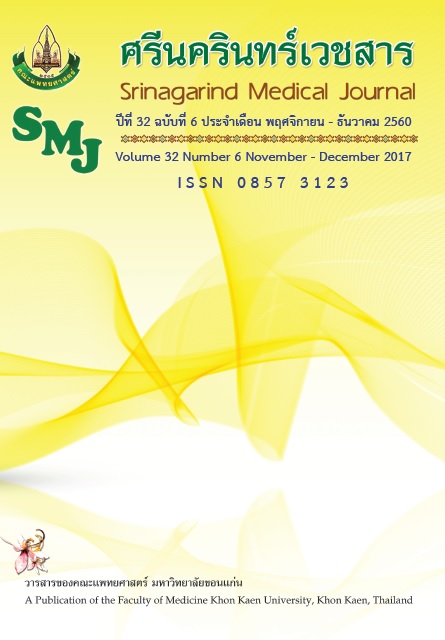A Comparison of Survival Rate between Stage II and III Colon Cancer after Surgical Treatment
Keywords:
Colon cancer; surgery; patient; survival rate; มะเร็งลำไส้ใหญ่; การผ่าตัด; ผู้ป่วย; อัตรารอดชีพAbstract
Background and Objective: Colon cancer is an aggressive disease and patients have high risk of mortality. Most of patients had abnormal symptoms of disease before they came to meet doctors. The surgical treatment of colon cancer might increase survival rate of patients. Therefore, the objective of this study was to compare survival rate of colon cancer between stage II and III after surgical treatment.
Methods: This study was a retrospective cohort study and all data were collected from medical records. New cases of stage II and III of colorectal cancer patients who were undergone surgery at Roi Et hospital during January 1, 2013 to December 31, 2015 were included in this study. The vital status of patients was followed up until they were death or it had reaches the end of this study (March 31, 2016). Descriptive statistics, Kaplan-Meier method and Log-rank test were used to analyze data.
Results: There were 220 new cases of patients who were newly diagnosed as stage II and III colon cancer and the majority of these patients were female (51.36 %) with mean of age at 62.49 + 12.60 years. The total follow-up time was 4,138 person-months and the overall median survival time was 30.4 months. There were 101 cases were death and the mortality rate was 2.44 per 100 person-months. The median survival time of 79 cases with colon cancer stage II was 52.6 months and the cumulative 6-month, 1-, 2- and 3-year survival rate was 87.09%, 74.82%, 63.95% and 55.16 %, respectively. The median survival time of 141 cases with colon cancer stage III was 17.8 months with cumulative 6-month, 1-, 2- and 3-year survival rate was 82.14%, 78.46%, 66.66% and 32.25 %, respectively.
Conclusion: The median survival time of stage II colon cancer patients after surgery was longer than patients with colon cancer stage III and the cumulative 3-year survival rate of patients with colon cancer stage II was higher than patients with colon cancer stage III.
หลักการและวัตถุประสงค์ : โรคมะเร็งลำไส้ใหญ่เป็นโรคที่มีความรุนแรงผู้ป่วยมีความเสี่ยงต่อการเสียชีวิตค่อนข้างสูงซึ่งผู้ป่วยส่วนใหญ่มักจะมีอาการของโรคก่อนจึงมาพบแพทย์ซึ่งการรักษาโรคมะเร็งลำไส้ใหญ่ด้วยวิธีการผ่าตัดอาจจะช่วยเพิ่มอัตรารอดชีพของผู้ป่วยได้ ดังนั้นการศึกษาครั้งนี้จึงมีวัตถุประสงค์เพื่อศึกษาเปรียบเทียบอัตรารอดชีพของผู้ป่วยโรคมะเร็งลำไส้ใหญ่ระยะที่ 2 และ 3 ได้รับการรักษาด้วยวิธีการผ่าตัด
วิธีการศึกษา : เป็นการศึกษาแบบ Retrospective cohort study โดยดำเนินเก็บรวบรวมข้อมูลผู้ป่วยมะเร็งลำไส้ระยะที่ 2 และ 3 รายใหม่ที่ได้รับการผ่าตัดลำไส้ที่โรงพยาบาลร้อยเอ็ดระหว่างวันที่ 1 มกราคม พ.ศ. 2553 ถึงวันที่ 31 ธันวาคม พ.ศ.2557 จากเวชระเบียนและดำเนินการติดตามการมีชีวิตของผู้ป่วยทุกรายจนถึงวันที่ผู้ป่วยเสียชีวิตหรือวันที่สิ้นสุดการศึกษา (31 มีนาคม 2559) สถิติที่ใช้ในการวิเคราะห์ข้อมูลได้แก่สถิติเชิงพรรณนาการวิเคราะห์ระยะปลอดเหตุการณ์โดยใช้โค้งปลอดเหตุการณ์ของแคปลานและไมย์เออร์และสถิติ Log-rank test
ผลการศึกษา: พบว่าผู้ป่วยโรคมะเร็งลำไส้ใหญ่ระยะที่ 2 และ 3 รายใหม่จำนวน 220 รายส่วนใหญ่เป็นเพศหญิงร้อยละ 51.36 อายุเฉลี่ย 62.49 + 12.60 ปีรวมเป็นหน่วยศึกษา 4,138 ราย/เดือน ผู้ป่วยส่วนใหญ่มีระยะเวลารอดชีพหลังผ่าตัด 30.4 เดือน มีผู้ป่วยเสียชีวิตจำนวน 101 ราย คิดเป็นอุบัติการณ์ 2.44 ต่อ 100 คน/เดือน ผู้ป่วยระยะที่ 2 จำนวน 79 ราย ส่วนใหญ่มีระยะเวลารอดชีพ 52.6 เดือน มีอัตรารอดชีพ 6 เดือน 1, 2 และ 3 ปี ร้อยละ 87.09, 74.82, 63.95 และ 55.16 ตามลำดับ ผู้ป่วยมะเร็งระยะที่ 3 จำนวน 141 ราย ส่วนใหญ่มีระยะเวลารอดชีพหลังผ่าตัด 17.8 เดือน มีอัตรารอดชีพ 6 เดือน 1, 2 และ 3 ปี ร้อยละ 82.14, 78.46, 66.66 และ 38.25 ตามลำดับ
สรุป: ผู้ป่วยมะเร็งลำไส้ใหญ่ระยะที่ 2 หลังผ่าตัดส่วนใหญ่มีระยะเวลารอดชีพนานกว่าผู้ป่วยมะเร็งระยะที่ 3 และอัตรารอดชีพปีที่ 3 ของผู้ป่วยมะเร็งระยะที่ 2 สูงกว่ามะเร็งระยะที่ 3




